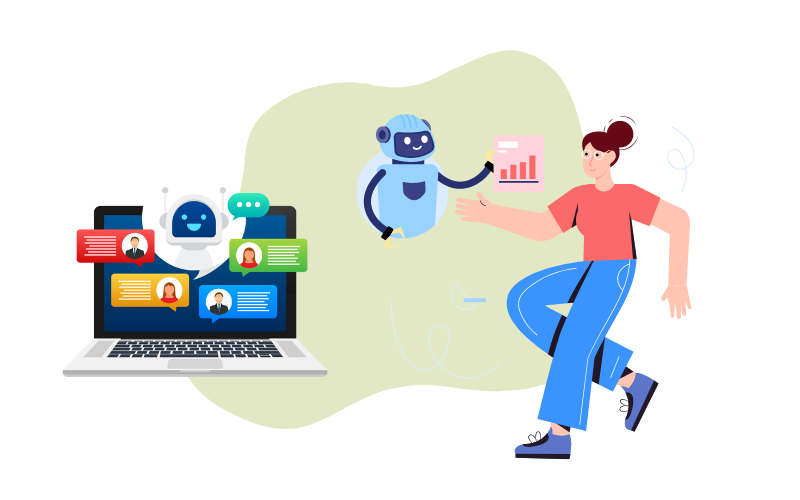Artificial intelligence has established itself as a game-changer in the marketing world, acting as a tool that can help great marketers be even better. AI can be used to personalise customer experiences, optimise campaigns, and predict consumer behaviour – although marketers with skill and drive are still necessary to turn AI-generated content into something genuinely useful.
It’s important to be wary of the pitfalls of AI software, as poorly generated content will fail to engage your audience and can harm your brand’s reputation. Marketing content generated by artificial intelligence can often look spammy, be of poor quality, and can hurt your marketing efforts, so it’s important to achieve the right balance if you decide to incorporate AI into your marketing strategy. Today, we’ll discuss eight of the things that you should avoid when using AI to create content.

1. Overly Generic Content
A common issue with using AI for marketing is that it can provide overly generic content lacking a unique voice or perspective. AI can seem like a time-saver when it comes to its ability to churn out vast amounts of content in such a short space of time, but content that is too generic will not resonate with your audience and can come across as uninspired or dull, especially if it’s just a rehashing of widely known information. An effective way to avoid being seen as generic or unoriginal is to set up your AI tools to incorporate your unique brand messaging and tone into any content produced; it’s a great idea to combine AI’s capabilities with human oversight to ensure that your brand’s personality and perspective still shine through from within your content.
2. Keyword Stuffing
AI is often used by businesses to improve search engine optimisation (SEO), although relying on this too heavily can result in keyword stuffing. Keyword stuffing is a term used to describe content that has had too many keywords inserted into it, making it unreadable and unnatural. Search engines have actually become sophisticated enough to penalise content like this, which results in decreased visibility and lower rankings. High-quality content that resonates with your audience should be prioritised over solely focusing on keywords; you can still use AI to help you identify relevant keywords, but it’s important to integrate them naturally within genuinely engaging content.
3. Lack of Emotional Connection
The lack of emotional connection that can be apparent is a huge drawback of using AI-generated content. Marketing is about connecting with your target audience on an emotional level rather than just providing information about your brand or business, and AI can generate text that is factually correct but fails to capture the nuances of human emotion. This can make your content seem impersonal or cold, so it’s essential to manually refine any AI-produced content to give it that human touch. Adding humour or personal anecdotes can transform sterile content into compelling content that your readers can relate to. It’s also important to stay away from over-automation, as using too much AI-generated content can strip away the personal touch that’s needed for effective marketing.

4. Poorly-Written Copy
Even though AI tools are becoming more and more powerful, they aren’t perfect – it’s possible for them to produce content with grammatical errors, inconsistencies, or awkward phrasing. This can result in hard-to-read copy and potentially hurt the professionalism of your brand, so an important step to take is to always review and edit any AI-generated content before publishing it. Manually combing through any AI-written copy to ensure that it reflects your brand’s quality standards will maintain a better level of readability in your copy as well as your reputation among your target audience.
5. Inaccurate or Outdated Information
Again, AI software is not infallible – these systems rely on the data on which they have been trained which can sometimes be incorrect or outdated. This can therefore lead to factually inaccurate or misleading content being generated, which can damage your credibility and affect your audience’s trust in your brand. To combat this, introduce a fact-checking process for any content that you produce through AI; cross-reference the information provided with reliable sources and ensure that any data or claims that are made are up-to-date.
6. Repetitive and Predictable Content
If the AI tool you’re using relies heavily on templates or follows a rigid set of rules, the algorithm can end up producing repetitive content. Your audience will quickly lose interest in content that comes across as formulaic, so it can be a great idea to diversify AI-written content by infusing it with creativity and variety. Use a range of tones, formats, and styles to keep your audience engaged and coming back for more.

7. Lack of Cultural Sensitivity
AI software can sometimes create content that is culturally insensitive or comes across as inappropriate, particularly if it has not been trained on diverse datasets. This can lead to mistakes being made that can alienate some of your audience, and even result in your brand’s reputation being completely destroyed. Try to use AI tools that have been trained on more diverse datasets, and incorporate a manual process into your strategy to review any AI-generated content to ensure that it aligns with your brand’s ethical standards and is inclusive. Involving diverse teams in your content-reviewing process is highly recommended, as being able to garner an array of different perspectives is invaluable, and you’ll also have more of a chance of catching potential issues that could arise from any AI-produced content.
8. Ignoring Ethical Considerations
The use of AI in marketing can raise some ethical questions, particularly around data privacy and the manipulation of said data. Using AI tools to track and predict the behaviour of consumers can be seen as intrusive if you aren’t transparent about it; misusing AI for these purposes can lead to backlash and loss of trust as you could be seen as exploiting consumer vulnerabilities. Adopt ethical practices within your use of AI software – be transparent with your audience about how their data is used to give them some control over their personal information. Consumer trust and data security should be prioritised in all of your marketing efforts.
While AI definitely has the potential – and has already begun to – revolutionise marketing, it’s crucial to not overuse it and to be aware of its pitfalls to make sure you don’t disengage your audience. To successfully integrate artificial intelligence into your marketing strategy, you should take a balanced approach that combines the efficiency and pattern recognition skills of AI alongside the irreplaceable creativity and empathy that comes with the human touch. By utilising the strengths of both AI technology and human insight, you’ll be able to create high-quality, engaging, and ethical content that will genuinely resonate with your target audience and maintain your brand’s reputation.





